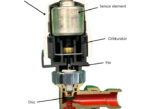
Remeha has achieved independent certification for its Quinta Ace, Gas 220 Ace and Gas 320/620 Ace boilers to operate on a 20% hydrogen blend. The Quinta Ace and Gas 320/620 Ace also offer NOx emissions of less than 24mg/kWh (Class 6) in compliance with the maximum two credits available under BREEAM, enhancing the sustainability of the installation.
Hydrogen is one of a combination of viable solutions that will help achieve the UK’s 2050 net zero ambition, along with electrification and low carbon heat networks. Ahead of the full conversion of the gas network to 100% hydrogen, using a blend of natural gas and 20% hydrogen across the UK could save six million tonnes of carbon dioxide a year, equivalent to taking 2.5 million combustion engine cars off the road.
Remeha Product Manager Paul Arnold said: “There has been a lot of hype surrounding hydrogen in recent months. Securing independent certification for our condensing boilers means peace of mind for specifiers, contractors and end users that they are future proof to the proposed blend of natural gas with 20% hydrogen.”
New commissioning settings have also been introduced for Remeha’s Quinta Ace wall hung boilers and Gas 320/620 Ace floor standing boiler range, which enable the boilers to achieve NOx emissions below 24 mg/kWh. As such, these boilers now qualify for the maximum two credits available in Pol 2 of the sustainable building assessment scheme BREEAM.
Remeha’s condensing boilers are already hybrid ready as standard, which is said to make them the perfect heat source for heat interface units, low temperature heating and hybrid installations as well as for retrofit applications.
“Condensing boilers have an important role to play in setting older buildings on the path to net zero,” said Paul. “By ensuring that our boilers are low in NOx, suitable for use with renewable and heat network technologies, and certified to operate on a future 20% hydrogen blend, we hope to make it easier for customers and end users to make achievable progress towards improved sustainability.”













